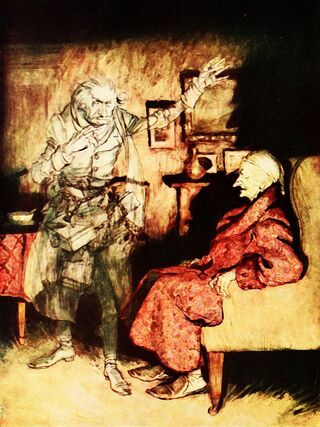Forgiveness
'Tis the Season to Extend Beyond Ourselves
Connect meaningfully with others.
Posted December 1, 2022 Reviewed by Michelle Quirk
Key points
- The holiday season is a special time to experience joy, acts of kindness, and genuine enthusiasm for other human beings.
- Forgiveness has more to do with our own well-being than that of the person or persons we forgive.
- By directing our attention and relating to something or someone other than ourselves, we make our own lives richer.

It’s that time of year again—a time to free ourselves from the shackles of the ego and extend beyond ourselves. Following so soon a holiday that ideally should remind us to be thankful and count our blessings, we now are approaching another special time that gives us reason to turn our attention to others.
With everything going on in the world at this time, it may be difficult for some to keep the spirit of Thanksgiving in their hearts and minds, let alone consider the plight of those around them. Yet, if there ever was a time to reach out to someone with the kind of joy, kindness, and enthusiasm for other human beings like that exhibited by the “reborn” Ebenezer Scrooge in Charles Dickens’s 1843 novel, A Christmas Carol, this is it.
Reluctance to Meaningfully Engage
Lest we risk being haunted in the middle of the night by the spirits of Christmas past, present, and yet to come, we’d better learn from Scrooge’s legacy of personal transformation and be willing to follow suit. Lately, however, I've been encountering people who seem intent on retreating from life—at best, sitting on the sidelines—and reluctant to engage with others in meaningful ways, even during what should be a festive time. Sadly, against the backdrop of the holiday season, many appear dejected, even fearful, and not very enthusiastic or passionate about life, especially after what they have experienced and witnessed over the past three years.
I hope that such a pessimistic attitude and lack of enthusiasm for the miracle of life does not extend too far and that we end 2022 and begin the New Year with optimism for the future. While the holiday season may not be a time of joy and happiness for everyone, I do not believe that this is the case for most people, especially for those who are able to shift their focus of attention from themselves to those in need and/or who are less fortunate.
Greeting the holidays with enthusiasm by exercising the ultimate freedom to choose one's attitude—a core principle behind the search for meaning—allows the human spirit to work its wonders, especially during hard times.1 Rather than suffering under the crushing weight of Jacob Marley–like chains, “enthusiasm,” which to the ancient Greeks was considered a form of divine possession,2 provides us with an antidote to despair and related symptoms along with the keys to true freedom, happiness, and well-being.
Forgiveness
This holiday season is also a good time to talk about another topic—forgiveness—that usually gets ignored when we feel like a victim and find it difficult to connect meaningfully with others. Indeed, getting to forgiveness is perhaps the most difficult and challenging thing we can do to go beyond ourselves when we are so fixated on our problems, our needs, and our demands. Let’s face it: When things are spinning out of control, and especially out of our control, it’s at least comforting and cathartic, even if it doesn't really resolve anything, to be able to point the blame on others for our situation.
Of course, getting to forgiveness under such circumstances is much easier said than done. But it can be done! And, importantly, our capacity to forgive actually provides us with yet another pathway to true freedom and self-empowerment that, at the same time, is a platform for healing what ails us and for confronting what challenges us.
Letting Go of Suffering
Forgiveness means “letting go” of our suffering. In effect, it has much more to do with our own well-being than that of the person or persons we forgive. When we hold on to our suffering—our resentment, hurt, and anger—we are inside ourselves with self-pity. It becomes a veil through which we see ourselves and others; it becomes something we have to feed, keep alive, and justify. If we don't, we think we are allowing the other person or people to be “right” in their unjust treatment of us. In short, we become prisoners of our thoughts and, by extension, victims of our personal circumstances.
But forgiveness can be one of the most powerful things we can do. Like any muscle, however, it has to be exercised to work well. Forgiveness can be very complicated. Sometimes we think that it equates to forgetting, diminishing, or condoning the misdeed, but it really doesn't. It has much more to do with freeing ourselves from its hold. Our ability to live our lives with love, understanding, kindness, and generosity is impeded when we don’t forgive.
It doesn't mean that we have to love and be generous to the individual who was disloyal to us at work or the co-worker who belittled our ideas at a staff meeting. Neither does it mean that we have to love and be generous to those government officials who dropped the ball by not managing the public’s business with integrity, transparency, and accountability, or to those corporate executives who dangerously let the will to make money take precedence over the will to find meaning at the public’s expense. No, this is not it. But what it does mean is that we forgive them and liberate ourselves from further captivity. Love and generosity, as well as understanding, will return in their own time and on their own terms. The same holds true for things that happen to us in our personal lives and relationships.
Importantly, when we authentically and enthusiastically go beyond ourselves—whether to achieve forgiveness, unselfishness, thoughtfulness, kindness, generosity, or understanding toward others—we enter into the spiritual realm of meaning. By giving beyond ourselves, we make our own lives richer. This is a truth long understood at the heart of all meaningful spiritual traditions. It’s a mystery that can only be experienced. And when we do experience it, we are in the heart of meaning, which is an ideal place to be, especially during the holiday season.
References
1. Frankl, V. E. (1992). Man’s Search for Meaning: An Introduction to Logotherapy, 4th ed. Boston: Beacon; and Pattakos, A. and Dundon, E. (2017). Prisoners of Our Thoughts: Viktor Frankl's Principles for Discovering Meaning in Life and Work, 3rd ed. Oakland, CA: Berrett-Koehler Publishers.
2. See: Pattakos, A. and Dundon, E. (2015). The OPA! Way: Finding Joy & Meaning in Everyday Life & Work. Dallas, TX: BenBella Books.




